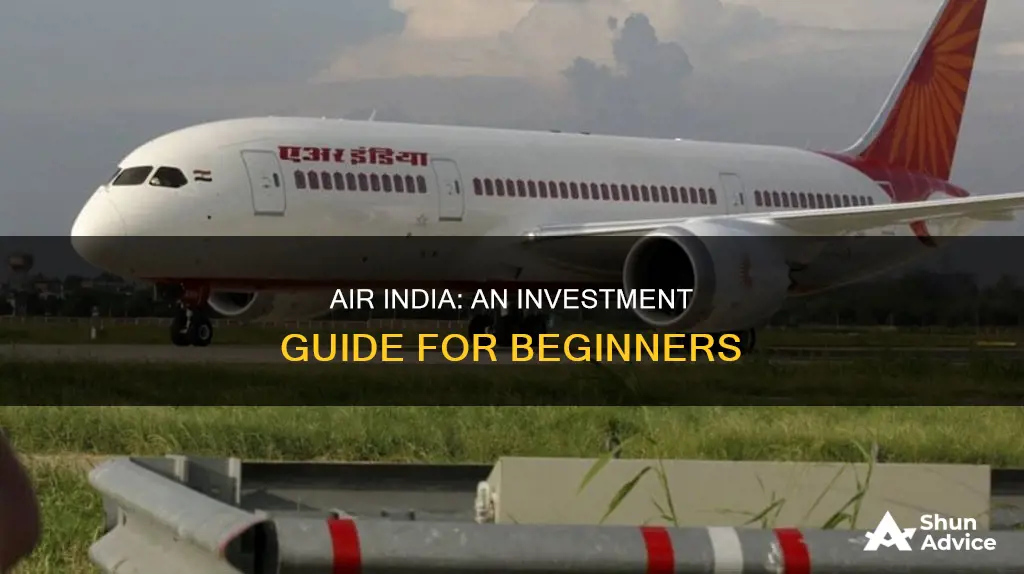
Air India has been a loss-making airline for years, with a massive debt of close to Rs 70,000 crore. However, in October 2021, the Tata Group won the bid to buy the airline for Rs 18,000 crore, beating competitor SpiceJet's Ajay Singh. The deal includes taking over Rs 15,300 crore of debt and paying the remaining Rs 2,700 crore in cash. The transaction is expected to be completed by December 2021, with the Tata Group taking over 100% of Air India and its subsidiaries. This move is seen as a positive step for the Indian aviation industry, with Air India expected to make a potent revival under the Tata Group's leadership.
What You'll Learn

Air India's history and future outlook
Air India, India's oldest airline, has a long history that can be traced back to Tata Air Services, founded by entrepreneur JRD Tata in 1932. Initially, the airline transported mail, but it soon expanded into passenger operations and added new routes, including its first international route to Colombo, Sri Lanka, in 1938. After World War II, Tata Airlines changed its name to Air India and became a public limited company in 1946. In 1948, Air India operated its first long-haul flight from Mumbai to London Heathrow, marking a significant milestone.
Over the years, Air India continued to expand its fleet and network, adding destinations such as Rome, Paris, Hong Kong, Tokyo, and Singapore. However, in the late 2000s, the airline started facing increasing competition and financial struggles. Despite its historical success, the government attempted to privatize Air India in 2018, but failed to find a buyer. In 2020, the government approved a new proposal to divest 100% of its stake in the airline.
In 2021, the Tata Group successfully acquired Air India, marking a return to its roots. The winning bid was for Rs 18,000 crore, which included taking over debt and a cash payment. This move was celebrated by many, as it was expected to bring about a potent revival of the airline that set trends in the 1950s and 1960s. The Tata Group's deep pockets and successful turnarounds of other businesses inspired confidence in Air India's future.
Since the takeover, Air India has been making significant moves to strengthen its position. In 2022, the airline appointed a new CEO and announced plans to merge with Vistara by 2024. Additionally, Air India placed a substantial order for 470 aircraft, including Airbus and Boeing models. The airline also unveiled a new brand identity, including a livery that has sparked varied opinions.
Looking ahead, Air India aims to reclaim lost routes and take advantage of bilateral agreements and connections to regions such as Africa, Southeast Asia, Australia, the Pacific, and Latin America. The airline's focus on international operations and its position as a predominantly global carrier is expected to boost foreign exchange earnings for India. With the support and resources of the Tata Group, Air India is poised for a strategic market offering, similar to the Lufthansa Group and its subsidiaries.
While Air India faces challenges, including capacity crunches and competition from low-cost carriers, its future outlook appears positive under the Tata Group's leadership. The combination of renewed passion among employees, a long-term investment perspective, and the potential for improved operational efficiency bodes well for the airline's revival and success in the highly competitive aviation market.
Building a Portfolio: Investing Strategies for Beginners
You may want to see also

The Tata Group's winning bid
The acquisition includes Air India's wholly-owned subsidiary Air India Express, a low-cost carrier focusing on short-haul international operations, particularly in the Middle East market, and a 50% stake in Air India SATS, a joint venture providing airport services and cargo handling. The total employee strength of Air India and its subsidiary is 13,500.
The Tata Group's chairman, N. Chandrasekaran, expressed his delight at winning the bid, calling it a "historic moment" and a "rare privilege" to own and operate India's flag bearer airline. He also paid tribute to JRD Tata, the pioneer of Indian aviation. The group intends to build a world-class airline that makes every Indian proud.
The acquisition gives the Tata Group ownership of iconic brands like Air India, Indian Airlines, and the Maharajah. Air India has a significant international presence, with more than two-thirds of its consolidated revenues coming from international markets. It serves 42 international destinations and has a strong footprint in North America, Europe, and the Middle East.
The transaction is expected to be completed by the end of December 2021, with the Tata Group taking over a considerable debt burden and aiming to revive Air India's reputation and performance in the highly competitive aviation market.
The successful bid by the Tata Group has been well-received, with billionaire investor Rakesh Jhunjhunwala commenting that it gives confidence to the stock market that the government's divestment plan is on track.
Understanding Fair Investment Management Fees: What You Need to Know
You may want to see also

Air India's financial situation
Air India has been in financial trouble for years, with losses dating back to its merger with Indian Airlines in 2007. The airline has been described as a "white elephant", with a mountain of accumulated losses and a history of poor financial decisions.
In 2018, Air India incurred accumulated losses of Rs 53,583.92 crore, which was above India's entire health budget for that year. The airline has never made a net profit since the merger, with a net loss for 2017-18 of Rs 5348.7 crore, or an average daily loss of Rs 15 crore. This made Air India the second-biggest loss-making Central Public Sector Enterprise among 339 such companies in 2018.
The airline's financial woes can be attributed to several factors, including high fuel prices, an unfavourable exchange rate, and the cost of aviation fuel. Additionally, the decision to buy 111 new planes and the ill-timed merger with Indian Airlines have been blamed for the poor financial situation. The airline also faced competition from private carriers in India's intensely competitive aviation market.
In 2021, the Tata Group bought Air India from the government for Rs 18,000 crore, outbidding a consortium led by SpiceJet's Ajay Singh. As part of the deal, Tata Sons took over Rs 15,300 crore of Air India's debt and paid the remaining Rs 2,700 crore in cash. The transaction was expected to be completed by December 2021.
Following the acquisition, Tata Group began discussions on bringing other airlines, including Vistara and AirAsia India, under the Air India umbrella. In 2022, Air India acquired AirAsia's stake in AirAsia India and announced plans to merge it with Air India Express. The same year, Air India appointed Natarajan Chandrasekaran, the chairman of Tata Sons, as the chairman of the airline, and Campbell Wilson as the CEO and MD.
Under the new management, Air India has been working to turn around its financial situation. In 2023, the airline announced a rebranding exercise and placed a record-breaking order for 470 aircraft from Airbus and Boeing. As of July 2024, Air India is consolidating its cargo operations and plans to establish a dedicated subsidiary for cargo operations.
Devising an Investment Portfolio: Strategies for Success
You may want to see also

The impact on the aviation market
Air India's privatisation will have a significant impact on the aviation market in India and beyond. Firstly, it marks the first major outright privatisation of a public sector company in almost two decades, which sends a strong signal about the government's commitment to its disinvestment programme. This move will help free up scarce government resources, which can now be redirected towards critical areas such as health and education.
The aviation market will also experience notable changes due to Air India's privatisation. One potential outcome is the creation of a monopoly, as the absence of state control might allow private monopolies to emerge. This could lead to increased flight ticket prices, as there would be no government subsidies to offset losses. On the other hand, privatisation may also result in improved efficiency and technology upgrades for Air India, enabling it to better compete with private players in the market.
Additionally, the integration of Air India's sizeable workforce will be a challenge, especially with soaring fuel costs and the impact of COVID-19 on air travel. The new owners, the Tata Group, will need to retain over 13,500 employees for one year before offering voluntary retirement. The privatisation also allows the Tatas to proceed with mergers, and they have already announced plans to merge Air India with Vistara and AirAsia India.
In conclusion, the privatisation of Air India is expected to have a mixed impact on the aviation market. While it may lead to increased efficiency and technological advancements, there are also concerns about the potential creation of monopolies and subsequent rises in ticket prices. The success of this privatisation will depend on effective regulation and people management to ensure a smooth transition for employees and a competitive market for consumers.
Understanding Managed Investment Schemes in New Zealand
You may want to see also

Air India's brand and reputation
Under the leadership of Mr J. R. D. Tata, Air India gained the reputation of being one of the most prestigious airlines in the world. However, following its nationalisation by the Government of India in 1953, the airline began to face challenges. Despite being a trendsetter in the 1950s and 1960s, Air India struggled financially and operationally for several decades, with frequent complaints about the quality of its service and aircraft.
In recent years, Air India has continued to receive mixed reviews. While some passengers report positive experiences, with comfortable seats and friendly crew members, others have criticised the airline for issues such as delayed or cancelled flights, non-functional entertainment systems, and poor customer service.
However, with the Tata Group regaining ownership of Air India in 2022, there is a sense of optimism about the future of the brand. Mark D Martin, CEO of Martin Consulting, predicts a "potent revival" for the airline under the Tata Group, suggesting that it will once again become a strategic market offering and a source of national pride for India. The Tata Group has deep pockets and a history of successful business turnarounds, so there is reason to believe that Air India's brand and reputation will be enhanced under their stewardship.
Indeed, N. Chandrasekaran, Chairman of Tata Sons, has expressed his commitment to building "a world-class airline that makes every Indian proud." This includes plans to modernise the fleet, improve operational efficiency, and enhance the overall customer experience. In conclusion, while Air India's brand and reputation have endured a tumultuous journey, there is hope that it will regain its former prestige and positively contribute to India's aviation industry and national identity.
Invest Wisely: Understanding Managed Futures for Beginners
You may want to see also
Frequently asked questions
Tata Group owns Air India.
Tata Sons bought Air India for Rs 18,000 crore, outbidding a consortium led by SpiceJet's Ajay Singh, who bid Rs 15,100 crore.
The Tatas will own 100% of Air India and its subsidiary Air India Express, and 50% of Air India SATS.
Air India was set up as Tata Airlines by JRD Tata in 1932 and sold to the government in 1953.
Mark D Martin, CEO of Martin Consulting, predicts a "very crowded market" and "a lot of competition" but believes that Air India will be able to take back whatever it has lost over the last 40 to 50 years in terms of routes and flights.







